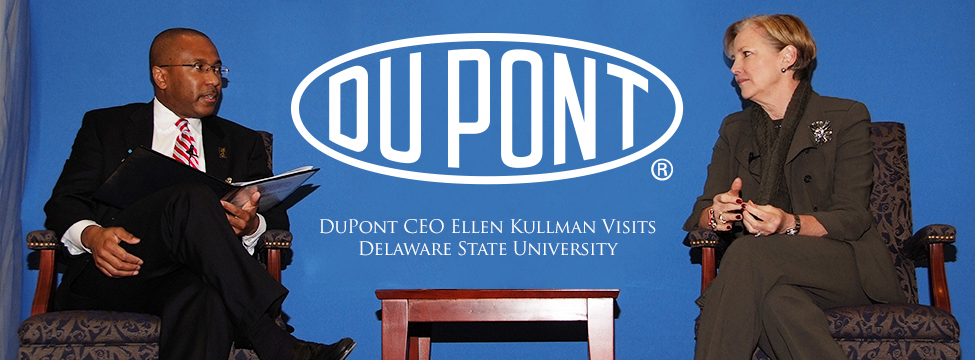
DuPont CEO Ellen Kullman Gives Corporate Wisdom during DSU Visit
|
|
Ellen Kullman, CEO of DuPont and the chair of its Board of Directors, and DSU President Harry L. Williams engaged in a dialogue during a Feb. 11 Open Forum on the current emphasis of Delaware’s largest private employer, the importance of connecting science with the marketplace, and the important skills needed to work for the company.
The discussion took place on stage in the Bank of America Building’s Longwood Auditorium before a standing-room-only crowd of students and faculty.
As the DuPont CEO since 2009, Ms. Kullman is the 19th executive to lead the company since DuPont was founded in 1802. In overseeing the science company – which has 66,000 employees worldwide – Ms. Kullman has been ranked as #3 among the "50 Most Powerful Women in Business" by Fortune magazine, and also was named one of the 50 "World’s Most Powerful Women" by Forbes magazine.
Prior to the Open Forum, Ms. Kullman paid a visit to the Martin Luther King Jr. Student Center where she spoke with student and faculty scientists about the 14 research projects that were on display there in poster presentations.
“It was very exciting to see these research projects,” Ms. Kullman said. “I enjoyed the passion that the researchers had for what they are doing.”
The DuPont CEO shared that she is a native of Wilmington. After earning a Bachelor of Science degree in Mechanical Engineering, she worked for Westinghouse and General Electric before joining DuPont in 1988. On the way to DuPont, she earned a Master of Business Administration degree.
In noting that DuPont is a market-driven global science company, Dr. Williams asked the CEO how DuPont “connects the dots” from science to the market.
Ms. Kullman said that in the past, DuPont operated under the principal that if the company created the product, the marketplace would come.
“Now we spend a lot of time creating cross-sectional teams that work to bring science and engineering to the market,” she said. “If we don’t connect the dots from our science to the market, we won’t be successful.”
|
|
The CEO noted that DuPont has established 12 Innovation Centers around the world, which are places for scientists, marketers and customers to come together and talk about what can be. “It has globalized our company,” she said.
Ms. Kullman said in order to stay relevant and successful, DuPont has had to “give up the past, look to the future and do it strategically.” In doing so, DuPont has let go of its longtime traditional paint products operation and also announced plans to spin-off its chemical division to become a standalone operation.
“I ran one of those businesses, so it was hard,” Ms. Kullman said. “But at the end of the day, I had to think of the greater whole.”
She said because it is a science company, innovation is essential.
“If we stop being an innovator, we will stop growing,” she said. “If we make our customers more successful, then we will be more successful.”
When Dr. Williams asked her if DuPont would support a public-private partnership to train scientists for the new agriculture revolution, Ms. Kullman said while DuPont believes such partnerships are important, it is equally important for the goals to be aligned.
“It has got to be set up for the right kind of success,” she said. “It is more than just giving money, but the money should go to something that you value and that we value.”
Ms. Kullman talked about the importance of how leaders communicate. “I have learned that the consistency of message is important,” she said. “I have learned I need to spend 50 percent more time on communications than I would naturally do.”
In talking about the skills DuPont is looking for in college graduates, she said the areas of finance, accounting, marketing, sales, engineering and science research are disciplines important to the company.
But she also noted that students should become adept at soft skills.
“With the interns we get, I am always interested in learning if they can work as a team,” Ms. Kullman said. “You have to work with people, and for that reason soft skills are important.”
She also stressed the importance of finding good mentors. “Mentors helped me understand my self-awareness, how I come across to people,” Ms. Kullman said. “I think you need to seek out people who will tell you the truth.”


 Ellen Kullman shared how she worked her way up through the ranks of DuPont to become its CEO.
Ellen Kullman shared how she worked her way up through the ranks of DuPont to become its CEO. Ellen Kullman listens to Rita-Kusi Appiah, a plant science graduate student, who explains her epigenetics research.
Ellen Kullman listens to Rita-Kusi Appiah, a plant science graduate student, who explains her epigenetics research.